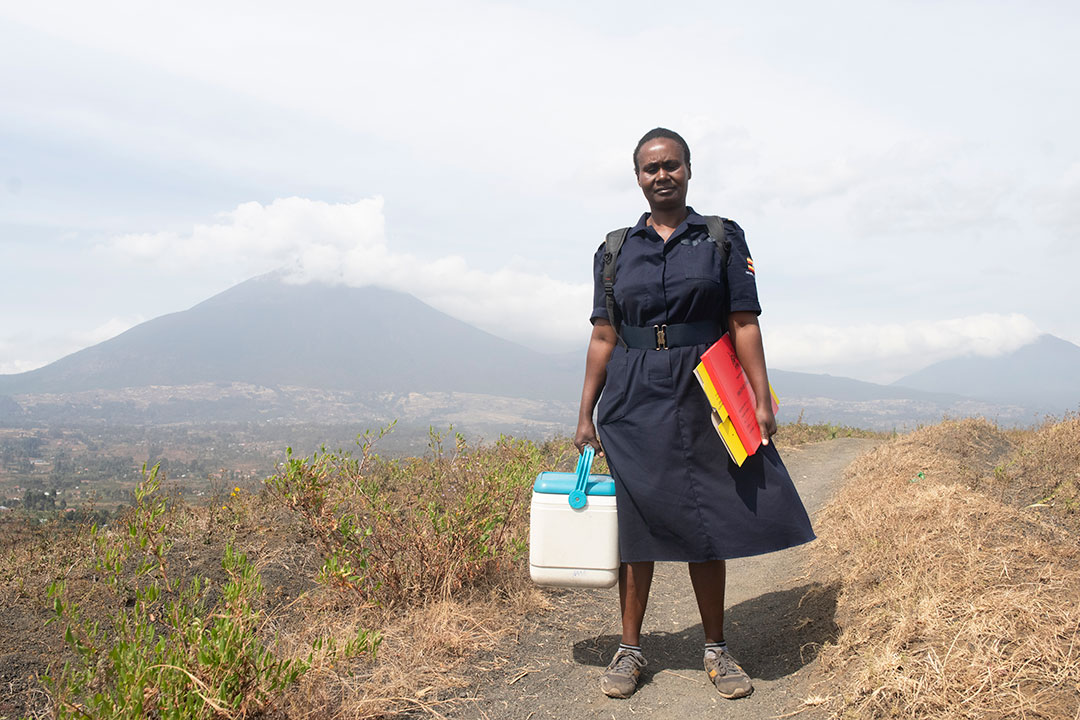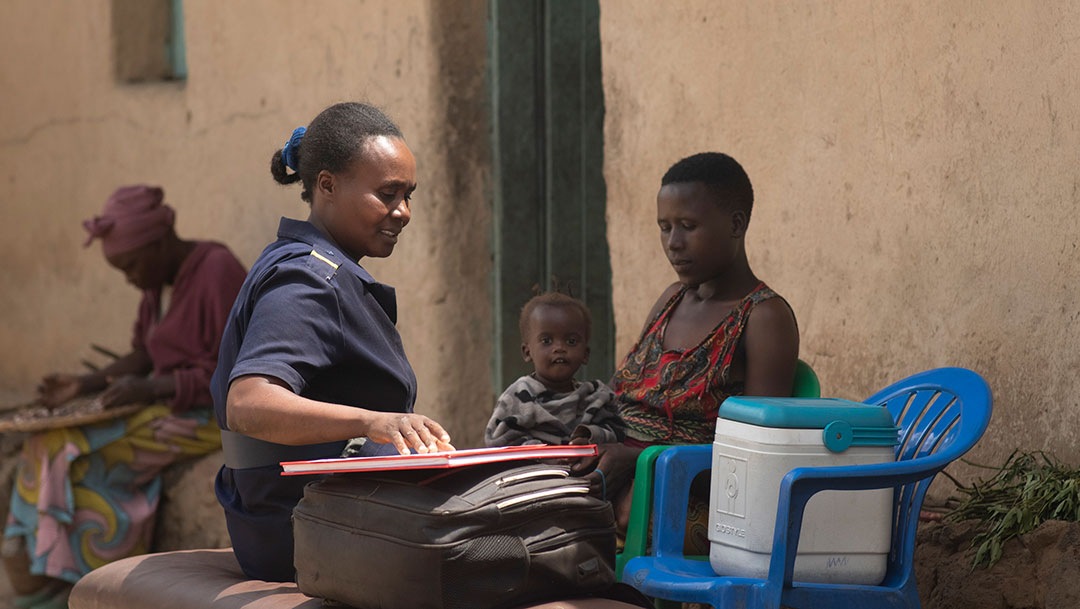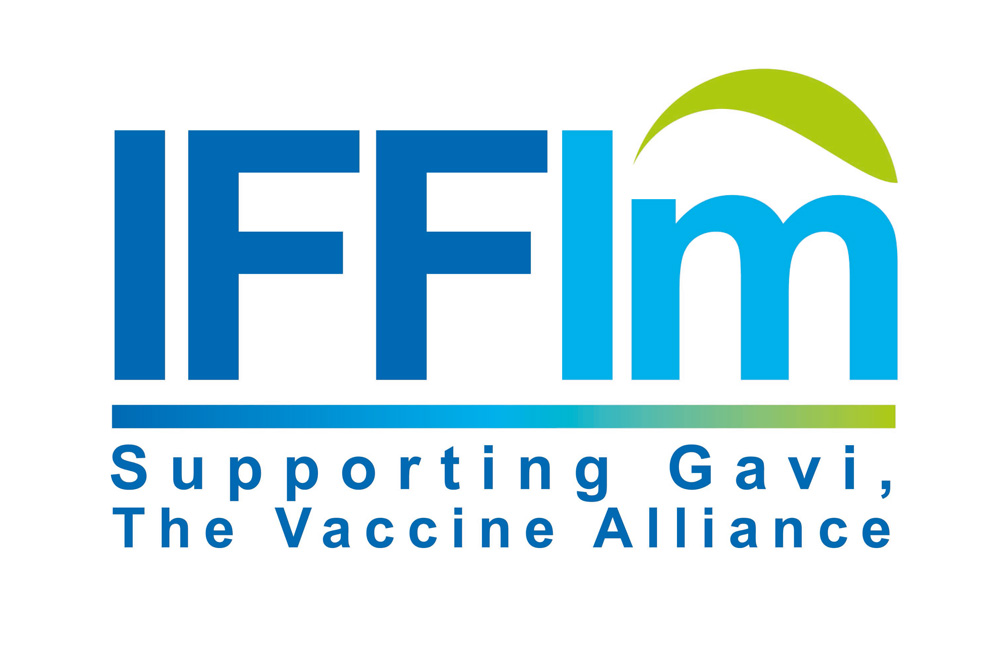A mountain to climb: often – too often – the “last mile” is a health worker’s extra mile
- Impact
- A mountain to climb: often – too often – the “last mile” is a health worker’s extra mile
A mountain to climb: often – too often – the “last mile” is a health worker’s extra mile
4 October 2022

Health worker Michelline Uwimana during her trek to Uganda’s remote Batwa people. Credit: Gavi/2022/Nes Motion Media
Michelline Uwimana treks through the mountainous terrain of rural Uganda come rain or shine. The walk is gruelling, but the alternative – communities going without vital healthcare – would be worse.
Michelline Uwimana treks through the mountainous terrain of rural Uganda come rain or shine. The walk is gruelling, but the alternative – communities going without vital healthcare – would be worse.
By Maya Prabhu, George Stanley Nsamba
Announcements
IFFIm impact: Uganda
IFFIm funding of US$ 54 million has supported Gavi's immunisation and health system strengthening programmes in Uganda (2010 to 2021).
One morning in late July, Michelline Uwimana of Kisoro, Uganda, neat in a navy blue, skirted nurse’s uniform and good sturdy sneakers, carried the rudiments of a health clinic into the mountains. The sky above Mukungu was scumbled with dust, the vegetation anaemic from lack of rain, and the weather so blustery along the ridges that Uwimana cut a figure in italics, wedging forward into the wind.
Had it been April instead of July, it would have been wet instead of windy, the paths gummed with mud, but the nurse, her backpack, her vaccine cooler box, and armful of soft cardboard patient files would have been here just the same.
Uganda’s immunisation coverage has taken a hit in recent years, with the numbers of completely unimmunised “zero-dose children” growing between 2015 and 2020, according to Gavi estimates, and the numbers of children reached with the third dose of the diphtheria, pertussis and tetanus-containing (DTP) vaccine, the conventional yardstick for immunisation coverage as a whole, in 2020 and 2021 stalling below 2016 levels.
If the hamlets on these remote slopes have decent immunisation rates, Uwimana says, it’s only because the health workers of Bukimbiri Health Centre III – located a good distance away on swampy flat land edging Lake Mutanda, but still the nearest clinic – make a determined point of conducting door-to-door outreach sessions each month.
Repetition does not make the commute any easier. Transportation is the thorniest challenge of Uwimana’s working life, her 16-year nursing career. “Our facility has only one motorcycle,” she says. Even when the terrain allows for the vehicle’s use, the journey is a hassle and a risk. “It’s really a challenge. Sometimes you find two health workers with all the logistics and the one who is driving the motorcycle, we are all seated on the motorcycle, and it’s really uncomfortable.” Recently, fuel prices have spiked beyond the health centre’s anticipation, and Uwimana and her colleagues find themselves fronting the cash for a full tank. “It’s not lovely for us,” she acknowledges.
The fact is that in Kisoro, like in many other places, the health system’s last mile is too routinely a health worker’s extra mile. It’s not how it ought to be, Uwimana acknowledges, but the immediate alternative – fair-weather healthcare for the most vulnerable – is unconscionable.
The soil in Mukungu is poor, she explains, and so are the people. The rains here can be aggressive enough to wipe a crop right off a slope, sluicing waste and excrement into downhill reservoirs, imperilling the drinking water. On nutritional assessment days, she says, most kids here register as underweight.
If the hamlets on these remote slopes have decent immunisation rates, it’s only because the health workers of Bukimbiri Health Centre III make a determined point of conducting door-to-door outreach sessions each month.
Many Mukungu villagers are Batwa, an ethnic group once more commonly described as pygmy, isolated as much by a ruptured history as by ungenerous geography. Decades ago, Uganda’s Batwa were evicted from the forests that were their homes and livelihoods, turning them into conservation refugees. Today, Batwa people in southwest Uganda remain at disproportionate risk from disease – under-five mortality rates are much higher than in the population at large, and life expectancy among adults is lower. Access is an issue for most: according to a 2021 report, 69% of Batwa people surveyed said that the nearest clinic was more than 5km away.
“When I deliver a live baby, I’m motivated. When I treat a case, and that person becomes fine, I get motivated,” she says. There are targets to meet, and she pursues them competitively. “I really work hard.”
That’s true of people in Mukungu, for whom the journey down to the health centre is arduous. It costs twice – once in money and again in time – and can be made abruptly impossible by bad weather or a shortage of cash. “We get mothers who come from Mukungu to Bukimbiri Health Centre when they are pregnant, and they wait for one full month, just sleeping at the health centre, waiting for their labour.” They spend that time, she says, “dormant” – not working, still consuming, mortgaging an already insecure financial future for the confidence of access to obstetric care.
So Michelline Uwimana puts on her trainers, shoulders her vaccine cooler bag and makes herself a mobile buffer against the hazards of inequality; a patch, if not a solution. She takes the role seriously. “If a child misses [a vaccination] in a village, we call the local council, we call the Village Health Teams: ‘So-and-so is not accessing services. What happened?’ As the public health nurse, mostly, that’s my big responsibility. I make sure we follow them up, that we really complete.”
The energy for the work comes from the work itself. “When I deliver a live baby, I’m motivated. When I treat a case, and that person becomes fine, I get motivated,” she says. There are targets to meet, and she pursues them competitively. “I really work hard.”

Credit: Gavi/2022/Nes Motion Media
It’s evening before she starts her way back across the hill ridges, towards Bukimbiri and the end of her day. It’ll be late when she gets home, but that’s not unusual. The Mukungu villages aren’t Uwimana’s only hard-to-reach community. Just this week, she and two colleagues boarded a boat across Lake Mutanda to a large island, then hiked a steep trail to the island’s brow, to visit a community of firewood-sellers. At an improvised health camp in the mud-walled church, she examined a baby who had been running a fever for two straight weeks. Cases like these have to wait until the health care system moors up – which sometimes requires Uwimana to pay the boatman out of pocket.
Uwimana is clear on this much: these are the “sacrifices” she and her colleagues make to do their jobs. She’s not a martyr: the sacrifices as unwelcome as they are unnecessary, and she isn’t after applause. Her aspirations are robustly practical: “I recommend that public health nurses and workers be given more facilitation, be given means of transport, so the work is done well,” she says.
 |
This article is republished from VaccinesWork under a Creative Commons license. Read the original article. |
Share this article
Restricted Access Library
 The material in this Restricted Access Library is intended to be accessed only by persons with residence within the territory of a Member State of the European Union and is not intended to be viewed by any other persons. The material in this Restricted Access Library is provided by IFFIm for information purposes only and the materials contained herein were accurate only as of their respective dates. Certain information in the materials contained herein is not intended to be, and is not, current. IFFIm accepts no obligation to update any material contained herein.
The material in this Restricted Access Library is intended to be accessed only by persons with residence within the territory of a Member State of the European Union and is not intended to be viewed by any other persons. The material in this Restricted Access Library is provided by IFFIm for information purposes only and the materials contained herein were accurate only as of their respective dates. Certain information in the materials contained herein is not intended to be, and is not, current. IFFIm accepts no obligation to update any material contained herein.
Persons with residence outside the territory of a Member State of the European Union who have access to or consult any materials posted in this Restricted Access Library should refrain from any action in respect of the securities referred to in such materials and are otherwise required to comply with all applicable laws and regulations in their country of residence.
By clicking Access restricted content: DYNAMIC-LINK-TEXT I confirm that I have read and understood the foregoing and agree that I will be bound by the restrictions and conditions set forth on this page.
The materials in this Restricted Access Library are for distribution only to persons who are not a "retail client" within the meaning of section 761G of the Corporations Act 2001 of Australia and are also sophisticated investors, professional investors or other investors in respect of whom disclosure is not required under Part 6D.2 of the Corporations Act 2001 of Australia and, in all cases, in such circumstances as may be permitted by applicable law in any jurisdiction in which an investor may be located.
The materials in this Restricted Access Library and any documents linked from it are not for access or distribution in any jurisdiction where such access or distribution would be illegal. All of the securities referred to in this Restricted Access Library and in the linked documents have been sold and delivered. The information contained herein and therein does not constitute an offer for sale in the United States or in any other country. The securities described herein and therein have not been, and will not be, registered under the U.S. Securities Act of 1933, as amended (the "Securities Act"), and may not be offered or sold in the United States except pursuant to an exemption from, or in a transaction not subject to, the registration requirements of the Securities Act and in compliance with any applicable state securities laws.
Each person accessing the Restricted Access Library confirms that they are a person who is entitled to do so under all applicable laws, regulations and directives in all applicable jurisdictions. Neither IFFIm nor any of their directors, employees, agents or advisers accepts any liability whatsoever for any loss (including, without limitation, any liability arising from any fault or negligence on the part of IFFIm or its respective directors, employees, agents or advisers) arising from access to Restricted Access Library by any person not entitled to do so.
"Relief" for mothers in Bayelsa state as malaria vaccine makes waves
07 November 2025
